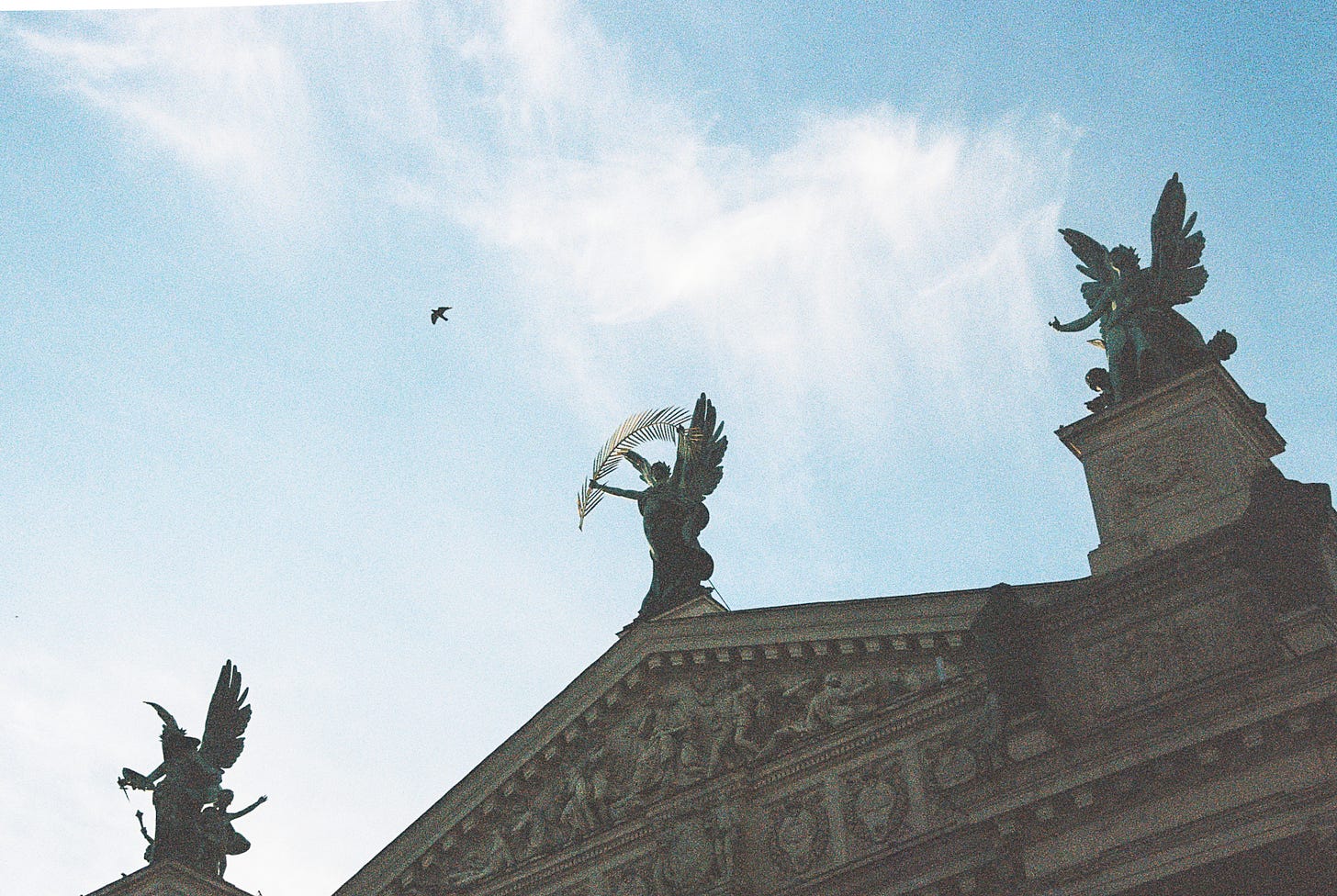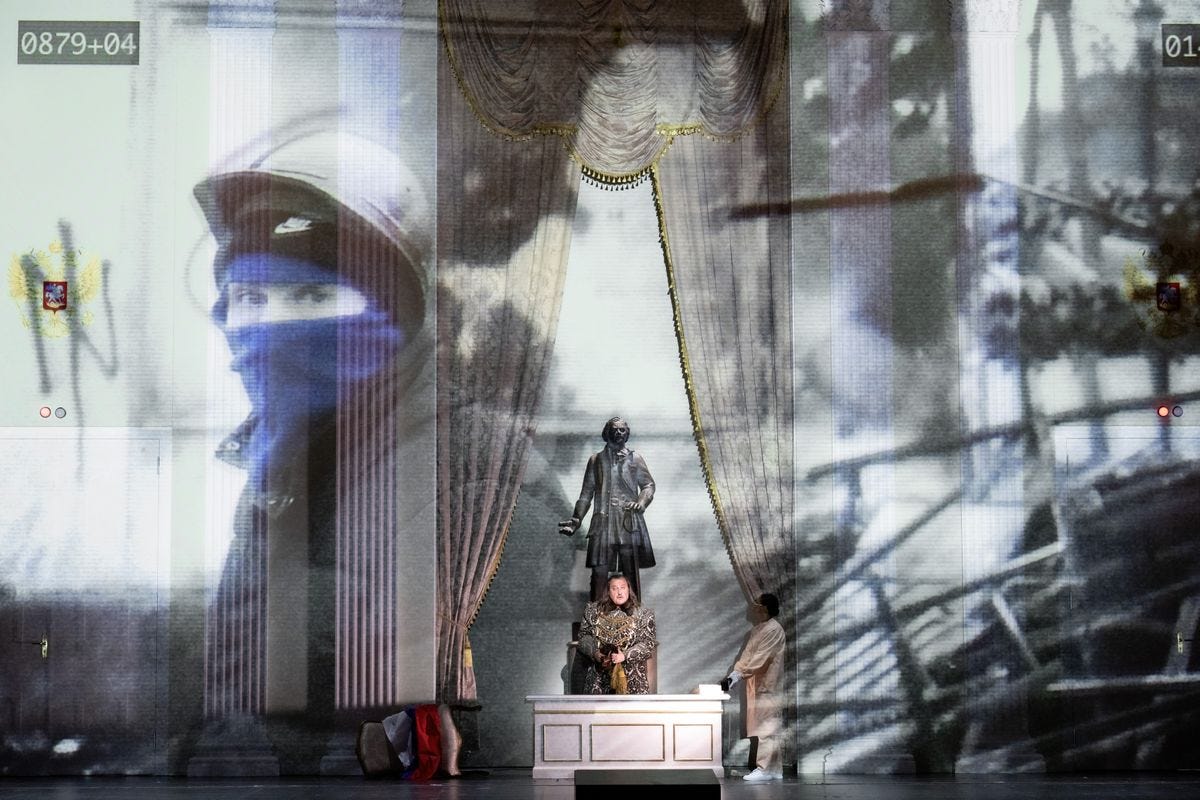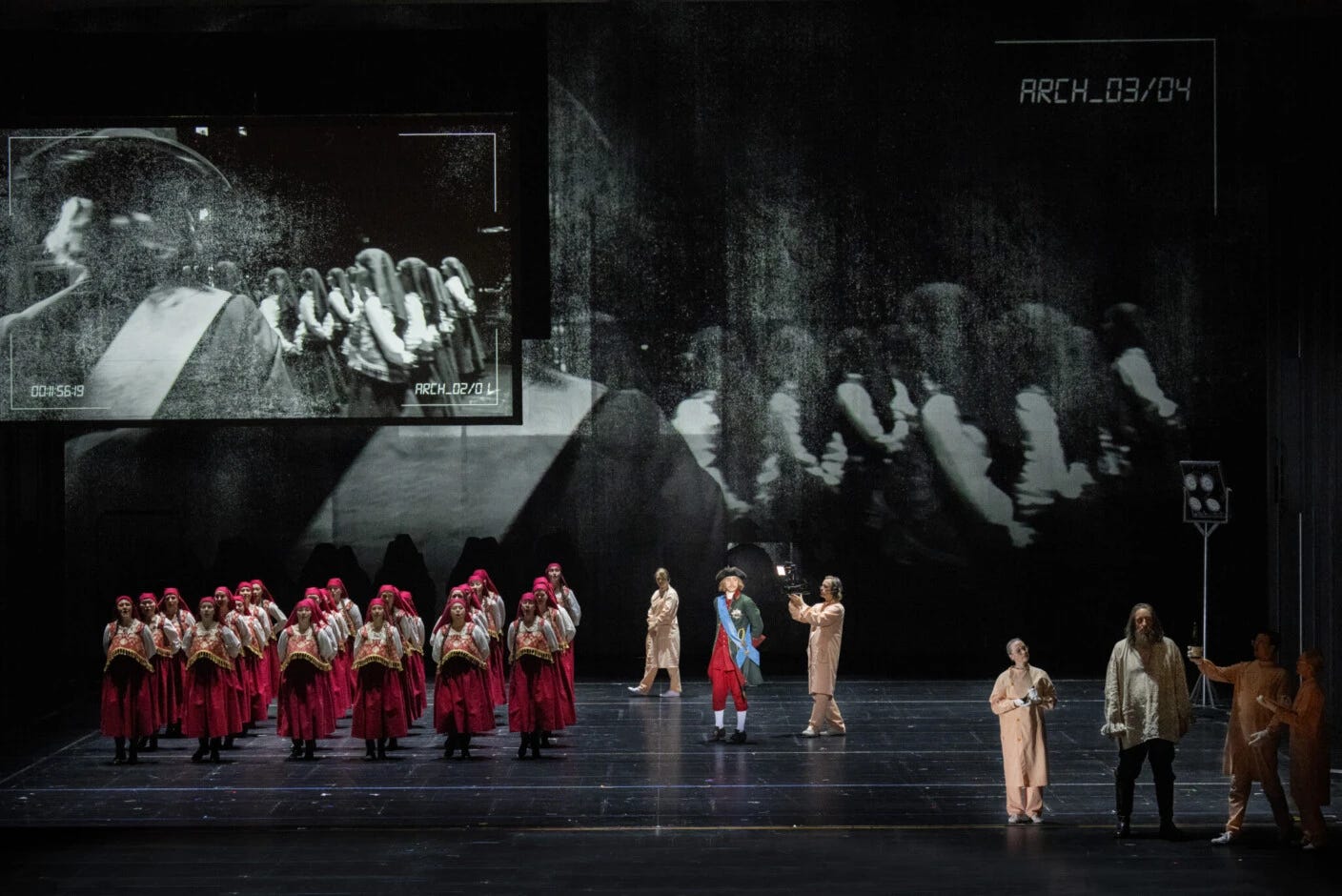After spending two weeks in western Ukraine, in part to report a story about the Lviv National Opera for the Financial Times, it felt a bit counterintuitive to come back to Berlin and settle in at the Staatsoper for three-and-a-half hours of Russian opera.

Amid the initial debates of canceling Putin versus Pushkin, I’ve been sympathetic to the de-russification of Ukrainian art, while also reluctant to abandon the Russian repertoire wholesale. As Elif Batuman points out in her New Yorker essay on rereading Russian writers in the shadow of the full-scale invasion, Pushkin himself — along with Dostoevsky and a host of other notable literary figures — was the victim of state repression. Of course, as Batuman notes, “being a victim of imperial repression doesn’t make you incapable of perpetuating repressive ideas.” This statement was made in direct reference to Dostoevsky, who reportedly believed that, without Russia, Ukraine (and Lithuania) would be left to “dark illiteracy, barbarism, and abject poverty.”
This is still a common talking point for nationalists who believe that all cultural achievements within Ukraine — the second largest country in Europe — come back to Russia. It’s also one that many of the artists at LNO argued directly in our interviews. “They tried to destroy the whole of Ukrainian culture,” the company’s musical director, Ivan Cherednichenko, told me while I was in Lviv. “Our task is to show that we have serious academic music.” I was persuaded by this argument, by Cherednichenko (who was my age and had lost both of his parents in the early days of the full-scale invasion), and by the Ukrainian operas I had seen while in Lviv, which had less in common with their Russian counterparts than they did with the works of Rossini, Schrecker, Strauss, and Bartók. I was especially shocked to learn that Yuliy Meitus’s hypnotic 1960 folk opera, Stolen Happiness, had only been performed as far west as Warsaw.
A point that can be made in addition to Cherednichenko’s — but not in place of it — is that there is something to be learned about Russia’s long legacy of state violence and imperialism through the works of a composer like Modest Mussorgsky. Last year, Giulio Maria Bianco captured the balancing act of this logic in unpacking La Scala’s decision to move ahead with its season-opening production of Boris Godunov, despite numerous protests from Ukrainians and allies. Bianco viewed the protests as focused on “the survival of a nation and the immeasurable suffering of its people,” which made it “egregious to question their legitimacy.” Yet, he added, there was an argument to be made for Boris Godunov on the basis of its narrative, “a story of power and violence, and how the two are inextricably linked,” and how, from this narrative, we can see “a characterization of Russia no different from that which we observe today.” (Aptly enough, Boris Godunov is based on Pushkin’s play of the same name.)
Mussorgsky’s Khovanshchina is an even rarer work in his catalog, even more unwieldy in historical scope, even more epic to stage, even more confounding in presenting in a definitive form, and even more damning of how little Russia has moved over the last 150 years. Left almost completely unorchestrated at the time of the composer’s death, it details a tumultuous period in Russian history that began with the death of Tsar Fyodor III in 1682, which led to a crisis of succession. Fyodor left no heirs. His 16-year-old brother Ivan was both physically and mentally disabled. By contrast, his half-brother Peter was capable, but only 10 years old. Both Ivan and Peter were crowned as co-rulers, with Ivan effectively a tsar in name only and with Peter’s mother installed as regent until he came of age. However, a rebellion led by Fyodor and Ivan’s sister Sophia (who had the loyalty of the elite Streltsy forces in her favor) led to her taking over as an autocratic regent, and the young Peter watching as his friends and family were murdered by the same guards meant to protect him. Despite several more attempts to overthrow his power, Peter would come of age and, following the death of Ivan in 1696, would become the sole leader and first emperor of Russia, known to history as Peter the Great.
It was the elaborate celebrations planned for Peter’s bicentennial in 1872 that left Mussorgsky in need of an artistic outlet for his frustration. “We’ve gone forward—you lie. We haven’t moved!” he wrote in a letter to the critic Vladimir Stasov that summer. “So long as the people cannot verify with their own eyes what is being cooked out of them, as long as they do not themselves will what is or is not to be cooked out of them — until then, we haven’t moved! Public benefactors of every kind will seek to glorify themselves, will buttress their glory with documents, but the people groan, and so as not to groan, they drink like the devil and groan worse than ever: haven’t moved!”
Khovanshchina, culled entirely from historical documents and court memoirs, details the wake of Sophia’s 1682 rebellion, and covers roughly 16 subsequent years of political unrest, internal factions, and state violence. Mussorgsky renders them in a flattened timeline whose deliberate vagueness (the action could, in this narrative, just as easily take place over the course of a few weeks versus a decade and a half) underscores the sense of not moving. For Mussorgsky, the work became an obsession, his quest to demonstrate “the past in the present.” The libretto he fashioned could be read as a 200-year-old body of evidence for the prosecution against Russia imperial rule.
But to what end? And in whose favor? Richard Taruskin notes in his history of Khovanshchina’s protracted development that Stasov continually griped to Mussorgsky about the fact that the characters were almost entirely of the noble class, despite Mussorgsky’s supposed alliance with “the people.” There was also the challenge of the censors, who prohibited the depiction of any member of the Romanov family in a staged work, meaning that Peter the Great — the crux around whom all of the internal divisions and intrigues revolve — is barely mentioned by name in the work. Its most famous section of music is the Prelude, a stunning, sonic portrait of dawn slowly rising over the Moskva River (a symbolic flow of history) that has become a perennial encore piece for orchestral concerts.
In his new staging for the Staatsoper, director Claus Guth transforms Peter from a background figure to the silent majority. At the top of each act, a series of actors play Peter in his progression from a child tsar playing with toy soldiers to a young adult in command of an all-too-human army. He’s flanked by even more actors, playing a crew of research scientists who seem to orchestrate Khovanshchina as some sort of lab-controlled experiment. They measure Peter’s height. They track Mussorgsky’s manifold main characters through a series of case notes beamed onstage just below the supertitles. At one point, as an older Peter realizes his hands are covered in blood, they scramble to clean them off, as though decontaminating the environment.
Guth originally conceived this idea for a 2020 run with the Staatsoper, which had to be rescheduled due to the pandemic. He reportedly revised his concept in the intervening years before it opened onstage earlier this summer; there was certainly plenty of history that could be added to Mussorgsky’s subtext — the full-scale invasion of Ukraine, protests in Kremlin-allied Belarus, the turbulent final years of Alexei Navalny, and the rebellion of the Wagner Group. If Guth doesn’t refer to these figures directly, he at least further unites the present with the past with a set that, at times, reveals the modern-day offices of the Kremlin Senate. This is, in fact, how the opera opens, its famous Prelude accompanying the motions of a political staff setting up the office for, presumably, Putin himself (the audience shared a knowing laugh when one extra sprayed down the telephone with disinfectant — a nod to Vladimir Vladimirovich’s germophobia).
During this mise-en-scene, I was disappointed to find that I wasn’t transported by the music, as I have been on previous listens. It, too, was just another step in bureaucracy, the perfunctory wait at the embassy or the DMV before one’s number is called. This would seem deliberate, and I very much doubt that Mussorgsky would want us to enjoy his music free from the burden of politics, either past or present. That said, Guth creates other images of aestheticized violence. The Prelude ends with a display of a quashed rebellion, of Streltsy lying onstage alongside a giant dead horse (insert the obvious metaphor here), filmed in Blair Witch-y handycam by the labcoats. The positions the soldiers take are deliberate, however, and I’m reminded of a passage from Chechen journalist-turned-partisan Mikail Eldin’s The Sky Wept Fire, in which Chechen fighter is wounded in combat and, believing his wound to be fatal, assumes a position out of heroic Soviet war cinema, bidding his friends farewell, smiling, and lying motionless in anticipation of death. A doctor then suggests he “get up… and save your pose for a more serious occasion.”
How odd to think that performance is the more serious occasion, the only place where we can see beautiful deaths. How odd to see this tableau after daily barrages of photos and videos from Gaza and Ukraine. It’s almost impossible to delude ourselves now that death on the battlefield is beautiful, for either a soldier or a civilian. Yet, judging by the reactions of the Staatsoper audience, perhaps I’m wrong. As with Charpentier’s Médée, there’s a clinical quality to everything that plays out in Guth’s vision, even more literally given the conceit of the labcoats. Nearly every act ends with silence, an uncertainty of whether or not to applaud even as the lights go out and the curtain comes down. My fellow operagoers seem more keen to find any excuse to laugh at an inside joke or moment where the labcoats interact with the historical figures, rather than the uncomfortable truths contained in the work.
I’m not even sure how interested Guth is in those uncomfortable truths. Instead, he seems to be serving up the gratifying sense of: Aren’t we so smart and above all of this history, sitting in our palace of art rather than dirtying ourselves with politics? When the scheming Shaklovity sings his Act IV aria,“The Streltsy Nest Sleeps” — a lamentation for a Russia lost amid the machinations of power and personal preservation — the Kremlin set is once again lowered, serving as the backdrop for a video cut of the country in the throes of the last century, from the end of the Tsars to modern-day protests broken up by violent police forces. Anyone who would feel superior for watching this from the comfort of an opera house on Unter den Linden would do well to go to Neukölln and see the police beating up 20-something-year-old activists peacefully demonstrating against modern-day abuses of power.

Or perhaps Guth is calling out the complicity of objective observation. Shortly after Shaklovity’s aria, the action moves to the palace of another 17th-century power player (and the namesake of the opera itself), Streltsy leader Ivan Khovansky. In denial that his own reign is about to come to an end, Khovansky calls for “the Persian girls,” a lead-in to the opera’s oddball ballet that nevertheless, in its own way, serves as an additional point in the case against Russian imperialism. Guth’s dancers come onstage as dervishes, who dance on eggshells in the face of Khovansky’s erratic and menacing observation. After a few false swipes, he stabs one of the dervishes, as if proving that he simply can. The others move around the corpse, like workers at an Amazon factory, but Khovansky isn’t satisfied and sets after the dancers, one-by-one. The labcoats aren’t prepared for this, and attempt to intervene, with one of their own being taken down in the process. Their great experiment is falling apart before their eyes.
Before the final scene of the opera (in which the religious sect of Old Believers, faced with persecution by Peter the Great, respond with a mass suicide by self-immolation), one of the labcoats reports via intertitles: “Unexpected development of the project, 23.06.2024, 20:58. Investigation abandoned.” They pack up their supplies and exit via the auditorium as the final chorus of martyrs echoes throughout the hall, and the Kremlin set comes down for a final beat. Is this Guth signaling the inevitability of history? Or is it a signal that we — yes, even those of us who aren’t Russian — still haven’t moved?
Where you come down on this as an audience member says more about yourself than it does about Guth.





I’m absolutely no expert, having only seen one production of this opera (Met, 2012), but I was DEEPLY moved by the music (the choruses!). I firmly believe any sort of production should be given a chance, but one of this opera that emphasizes head over heart seems like a wasted opportunity. We can be moved and also think at the same time.